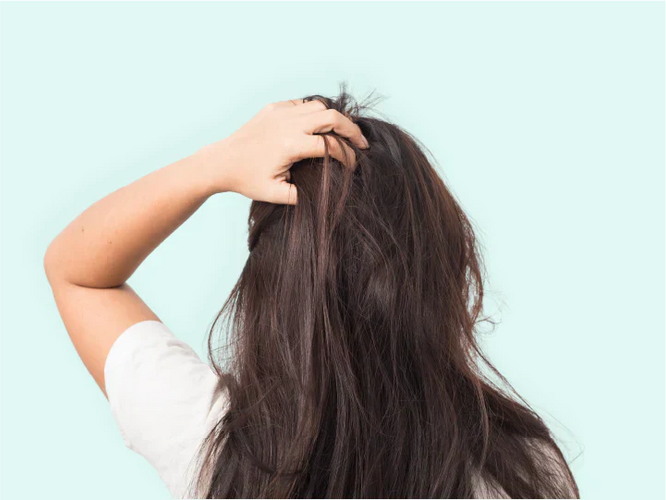- What happens in your scalp when it feels itchy?
- The possible underlying causes of an itchy scalp
- Can an itchy scalp cause hair loss?
- How can you reduce constant itching?
- Which ingredients can help to calm an itchy scalp?
- How do you keep your scalp in balance after the itch has improved?
- FAQ
- Conclusion
- Sources
An itchy scalp can be very annoying. It can feel as if your scalp never really gets a moment to rest. You may keep scratching it, which only makes the skin more sensitive. Many people experience this, and although it usually isn’t a sign of something serious, it can affect your daily life.
There are several possible causes of an itchy scalp, and each cause needs a different approach. In this blog, you will learn about the most common itchy scalp causes, how to recognise them, and what you can do to calm your scalp in a gentle way. With the right care, your scalp often finds its balance again and the itch becomes less.
What happens in your scalp when it feels itchy?
Your scalp is made up of skin, hair follicles, natural oils (sebum) and many small nerves. When the balance is disturbed, for example by stress, using a strong shampoo, or washing your hair too often. The skin can become dry or irritated.
When the skin barrier becomes weaker, the nerves in your scalp react more quickly. This can cause the itchy feeling. The microbiome on your scalp can also become unbalanced. This is the natural mix of helpful bacteria and yeasts that protect your skin. When this balance is disturbed, the scalp can become more sensitive and react faster.
The good news is that an itchy scalp is usually temporary. With gentle, calming products, the skin often recovers on its own.
The possible underlying causes of an itchy scalp
An itchy scalp can have many different causes. To understand where your itch may be coming from, it helps to look at other symptoms your scalp shows besides the itch itself.
In the table below, you can see for each cause:
- which symptoms you may notice in addition to the itchy feeling
- what you can usually do to calm the scalp or support recovery
For more serious scalp conditions such as psoriasis or fungal infections, we refer to separate in-depth articles.
Please see this table as a guide to help you recognise what might be going on. It does not give a diagnosis, but it helps you understand which direction to think in and what may fit your situation.
| Cause | Other symptoms (besides the itch) | What can help |
| Dry scalp | Small dry flakes, flakes fall out easily, no redness | Moisturising shampoos. Read more about dry scalp. |
| Dandruff (Pityriasis capitis) | Larger flakes, greasy or sticky, sometimes redness | Mild anti-dandruff shampoo. Read more about dandruff. |
| Seborrhoeic dermatitis of the scalp | Yellow or brown greasy flakes, redness | Read more about seborrhoeic dermatitis. |
| Scalp psoriasis | Thicker white-grey flakes at the front hairline and temples, redness | Read more about scalp psoriasis. |
| Fungal infection on the scalp | Small greyish flakes, spots or small pimples, crusts, bald patches, swelling | Read more about fungal infections on the scalp. |
| Tinea capitis (ringworm) | Bald patches, dry flakes, crusts, redness, swelling and small pus spots | Read more about tinea capitis. |
| Folliculitis | Red bumps or bumps with small pus spots | Read more about folliculitis on the scalp |
| Lichen planopilaris | Bald patches, burning feeling, red bumps around the hair follicles | Read more about lichen planopilaris. |
| Head lice (Pediculus humanus capitis) | Visible nits and lice in the hair | Remove with a lice comb; use calming care afterwards. |
| Sensitive scalp caused by hair products | Redness straight after washing, burning or tingling feeling | Use a perfume-free, sulphate-free shampoo. |
| Stress-related itch | Tight or tense feeling | Relaxation, scalp massage and calming care. |
Can an itchy scalp cause hair loss?
Yes, it can. When you scratch a lot, the skin can become damaged. The hair roots may then become weaker for a short time. This can make the hair fall out faster or break more easily. The good news is that this is usually temporary. Once the itch becomes less and the scalp has time to calm down, the hair growth often recovers on its own.
How can you reduce constant itching?
What helps against an itchy scalp depends on the cause. Still, there are a few gentle steps that bring relief for many people, no matter what is going on. These tips can help your scalp feel calmer while you try to find out what is causing the itch.
-
Wash with lukewarm water: Very hot water can dry out the skin.
- Use a gentle shampoo: Choose a shampoo without strong cleansers or perfume.
- Massage softly with your fingertips: Try not to scratch with your nails, as this can make the skin more sensitive.
- Pat your hair dry: Rubbing with a towel can make irritation worse.
- Give your scalp a break: Try to avoid heat tools such as a hairdryer or straightener for a while.
These steps do not always fix the cause, but they can make the skin feel less sensitive. This helps your scalp recover more easily once you know the right approach.
Which ingredients can help to calm an itchy scalp?
Which ingredients feel good on your scalp depends on the cause of the itch. Still, there are a few ingredients that many people find helpful because they make the skin feel calmer and more comfortable. Below are ingredients known for their mild and caring properties.
- Niacinamide: Helps support the skin barrier and can make the skin feel more comfortable.
- Panthenol: Keeps the skin soft and gives a soothing feeling.
- Piroctone olamine: Used in shampoos that help reduce flaking.
- Aloe vera: Cools the skin and feels pleasant when the scalp is sensitive.
These ingredients are not treatments for specific conditions, but they can support the scalp while you work on addressing the cause of the itch.
Would you like to learn more about how these ingredients work and which Neofollics products contain them? Then take a look at our ingredient overview. This makes it easy to see which products fit the needs of your scalp.
How do you keep your scalp in balance after the itch has improved?
When the itch becomes less, you naturally want to stop it from coming back quickly. A calm scalp benefits most from regular and gentle care. This helps keep the skin barrier strong, no matter what the original cause was.
- Use a gentle shampoo: Sulphate-free formulas often help keep the scalp more balanced.
- Do not wash your hair with shampoo too often: This can dry out the scalp. Use a shampoo that suits your hair type, as this helps you decide how often washing is right for you.
- Only exfoliate gently if your scalp likes it: Exfoliating means carefully removing dead skin cells from your scalp. You do this with a mild peeling product, a liquid, serum or gel with gentle acids that smooth the skin without scrubbing. A mild peeling can help keep the scalp clean and fresh, as long as you do not use it too often.
- Hydrate regularly: A nourishing mask or caring lotion can help keep the scalp soft and comfortable.
-
Pay attention to changes: If the itch returns quickly, look again at possible causes such as new products, seasonal changes or stress.
FAQ
Does scrubbing help with an itchy scalp?
Yes, as long as you do it gently. A mild peeling can help remove dead skin cells. Do not use it more than once or twice a week.
Can I rinse my scalp with water every day (without shampoo) if it feels itchy?
Yes, you can. Lukewarm water can help remove dirt without drying the skin. Use shampoo only as often as you need. This depends on your hair type and what feels right for your scalp.
Conclusion
An itchy scalp can have many different causes. Sometimes the skin is dry, sometimes dandruff or irritation plays a role, and in other cases something else may be going on. By looking carefully at the other symptoms besides the itch, you can often get a clearer idea of what might be causing it.
The best way to calm an itchy scalp always depends on the underlying cause. The gentle tips and ingredients in this blog can help your scalp feel more comfortable, but it is important to pay attention to the signals your skin gives you.
In most cases, an itchy scalp is temporary. With care, gentle products and a routine that fits your situation, the scalp usually recovers on its own and the itch becomes less.
Sources
DermNet NZ. (n.d.). Information about itchy scalp and related scalp conditions. Retrieved from https://dermnetnz.org
NHS. (2023). Information about dandruff and itchy scalp. Retrieved from https://www.nhs.uk
American Academy of Dermatology. (n.d.). Information about scalp concerns such as itching, dandruff and psoriasis. Retrieved from https://www.aad.org
Healthline. (2023). Medical-reviewed information about itchy scalp causes. Retrieved from https://www.healthline.com
National Library of Medicine. (n.d.). Articles about dandruff, seborrhoeic dermatitis and scalp inflammation. Retrieved from https://pubmed.ncbi.nlm.nih.gov
This information does not replace professional medical advice. If in doubt, always consult a doctor or specialist.













